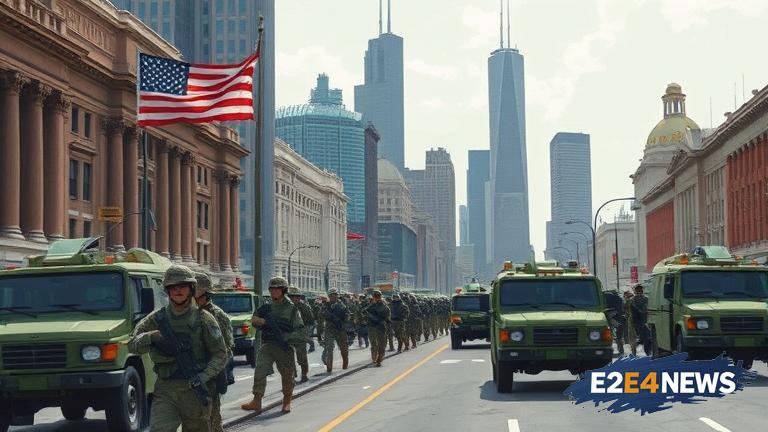In a recent statement, President Preckwinkle addressed the federal government’s threat to deploy troops to Chicago, citing concerns over the city’s ability to maintain law and order. The move has been met with widespread criticism from local leaders, who argue that the deployment of federal troops would undermine the city’s autonomy and potentially escalate tensions between law enforcement and the community. The situation has sparked a heated debate over the role of federal intervention in local affairs, with many questioning the motivations behind the threat. President Preckwinkle emphasized the importance of community-led solutions to addressing crime and public safety, rather than relying on federal intervention. She also highlighted the need for increased funding and resources to support local law enforcement and community programs. The threat of federal troop deployment has been seen as a political move, aimed at undermining the city’s progressive leadership and advancing a partisan agenda. Local residents and community leaders have expressed concerns over the potential consequences of federal intervention, including the risk of increased violence and militarization of law enforcement. The situation has also raised questions over the limits of federal power and the importance of protecting local autonomy. In response to the threat, President Preckwinkle has called for a unified response from local leaders and community members, emphasizing the need for collective action to protect the city’s interests. The situation remains fluid, with ongoing negotiations between local and federal officials. Despite the challenges, President Preckwinkle remains committed to finding community-led solutions to addressing public safety concerns. The city’s residents and community leaders are watching the situation closely, eager to see how the situation will unfold. The threat of federal troop deployment has also sparked a wider conversation over the need for police reform and community-led initiatives to address systemic issues. President Preckwinkle has emphasized the importance of addressing the root causes of crime, rather than relying on punitive measures. The situation has highlighted the need for increased transparency and accountability in law enforcement, as well as the importance of community engagement and participation in decision-making processes. As the situation continues to evolve, it remains to be seen how the city will respond to the federal threat and what the consequences will be for local autonomy and community safety. The city’s leadership has reaffirmed its commitment to protecting the rights and interests of its residents, and to finding solutions that prioritize community safety and well-being. The situation has also sparked a national conversation over the role of federal intervention in local affairs, with many questioning the implications for other cities and communities. In the midst of the uncertainty, President Preckwinkle has called for calm and unity, emphasizing the need for collective action to protect the city’s interests. The city’s residents and community leaders remain vigilant, eager to see how the situation will unfold and what the consequences will be for their community. The threat of federal troop deployment has also raised questions over the potential impact on local businesses and economies, with many concerned over the potential consequences for the city’s reputation and attractiveness to investors. As the situation continues to unfold, it remains to be seen how the city will navigate the challenges ahead and what the long-term consequences will be for local autonomy and community safety.
